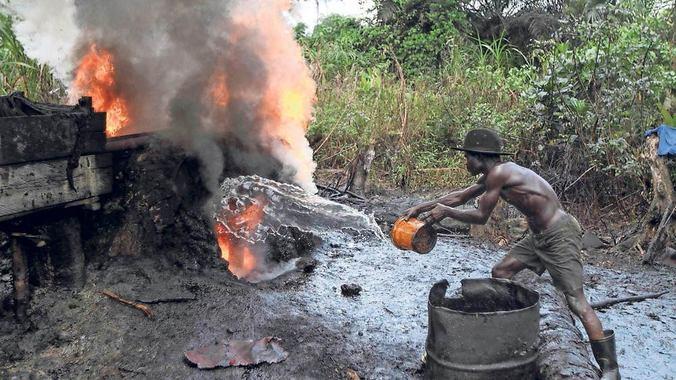
AFRICA IS CLOSED

"On the brink of a boom," was the banner on PricewaterhouseCoopers LLP's review of Africa's oil industry 16 months ago. Now, oil below $50 has made more than two out of three investment projects on the continent non-viable.
"Capital markets are effectively closed to the oil and gas industry" in Africa, Tony Hayward, former head of BP Plc and now chairman of Genel Energy Plc, said at a conference in Cape Town last month. "A decade of exploration, with billions of dollars invested and only limited commercial success."
When six of the 10 biggest global oil discoveries in 2013 were made in Africa, it underlined the potential of the energy riches that had lured companies from Royal Dutch Shell Plc to Exxon Mobil Corp. Governments have been slow to react as the slump in crude makes the royalties charged from Libya to Angola look punitive. African production, already 19 percent below its 2008 peak of 10.2 million barrels a day, is set to drop for a third year.
While final investment decisions have been made on less than 10 percent of the 48 billion barrels of oil equivalent discovered in the past decade, governments haven't adapted to the new environment, Martin Kelly, director for sub-Saharan Africa research at consultancy Wood Mackenzie, said in an interview at the Africa Oil Week conference. That means some nations including Nigeria, the continent's biggest producer, are proposing increasing royalties at a moment the industry can least bear it.
Changed World
"There are a raft of changes working their way through various parliaments around Africa at the moment and they've been primarily based on prices that were $100," Kelly said. "The world has changed since then."
African governments' profit share from deepwater oil projects off the continent ranges from 91.1 percent in Libya to about 60.7 percent in Gambia, according to data from Wood Mackenzie. That's higher than elsewhere in the world, with the continent's average onshore take of 66.1 percent being 8.5 percentage points above the global one, the consultants said.
Persuading governments to cut their share of the spoils won't be easy with the end of the oil boom destabilizing economies as revenue slumps and currencies tank. Nigeria, Africa's biggest producer, has imposed foreign-exchange restrictions to stabilize the naira, while second-ranked Angola has been forced to devalue its currency twice since June and slashed its budget by a quarter.
Nigeria has proposed increasing the government's share of profits and plans to review offshore contracts signed with oil companies two decades ago. The last draft of a proposed petroleum law, stalled in parliament for the past seven years, seeks to raise offshore taxes to 73 percent and those for onshore to 87 percent from 50 percent and 83 percent respectively.
Nigeria Exploration
Exploration drilling in Nigeria is close to the lowest in more than a decade because of shelved investment plans, according to the Petroleum Ministry.
With oil below $50 a barrel, only a third of $270 billion of potential investment projects in Africa make economic sense, according to Obo Idornigie, principal analyst at Wood Mackenzie.
Tullow Oil Plc, responsible for some of the biggest discoveries on the continent, is concentrating on safer projects in Ghana and Kenya after cutting jobs and trimming its annual exploration budget to about $200 million from $1 billion.
"We need a higher oil price" to meet future production requirements, Tullow Chief Executive Officer Aidan Heavey said in an interview, adding that companies need to react quickly to the current environment. "Do it quick, do whatever needs to be done and maximize the value of the core assets that you have."
Bailing Out
Kenya is among the African nations that tried to respond after the slide in crude prompted companies to start withdrawing drilling rigs.
"The government has to look for ways of bailing them out," Hudson Andambi, senior petroleum geologist at Kenya's Ministry of Energy. "Some have been given extensions just as an incentive to make them stay."
There are exceptions to the continent's woes, including the Rovuma basin, where Mozambique last month awarded exploration licenses to applicants including Exxon and partner, Rosneft OAO, said Chris Bredenhann, a partner at PwC in Cape Town. The programs proposed in Rovuma for the next four years may see investment of $700 million, the nation's exploration regulator said.
Clarity Needed
That optimism must be balanced against the need for further clarity on how a framework Mozambican law passed last year will be implemented, Bredenhann said. The absence of legislative and regulatory certainty has also halted investment of as much as $5 billion by explorers including Shell in South Africa.
With PwC's 2015 review of Africa's oil industry showing that many oil explorers assumed prices higher than $80 per barrel when modeling projects, additional risks are weighing on investment.
"Even without the oil price collapse, it was time for the industry and governments to take stock," Genel's Hayward said. "I'm afraid the next six to 12 months will be very challenging to many industry participants and survival will become the name of the game."
-----
More:





